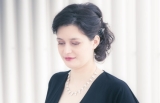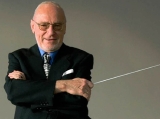Der Pianist Romain Nosbaum und der Tonmeister Manfred Schumacher gingen im Frühjahr in der Wuppertaler Immanuelskirche, die heute ein Kulturzentrum ist, in Klausur, um eine neue CD mit dem Titel ‘Encores’ aufzunehmen. Ein ganztägiger Besuch bei den Aufnahmesessions machte erlebbar, dass hinter einer guten Produktion immer die gelungene Symbiose aus Künstler, Komposition, Tonmeister, Raum und Technik steht. Read More →
Marco Battistella is an International Classical Music Awards nominated Producer and a voting member of the Recording Academy. He is the producer of a brand new production with Johann Sebastian Bach’s Goldberg-Variations on Hänssler Classic. Read More →
Maestro, Sie haben die Mahler-Symphonien mit dem ‘Koninklijk Concertgebouw Orkest’ eingespielt und tun jetzt dasselbe mit dem Symphonieorchester des BR. Was unterscheidet aus Ihrer Sicht die Aufnahmen?
Die beiden wunderbaren Orchester sind Individuen, wie zwei verschiedene Menschen. Jedes für sich hat eine eigene Persönlichkeit. Das wird auf den Aufnahmen natürlich deutlich. Read More →
Frau Weyer, nach ihrer vielgelobten ersten CD mit Solo-Werken von Debussy und Rameau (zur Rezension) ist nun ihre zweite Aufnahme erschienen. Diesmal mit den Klavierkonzerten Nr. 4 und 5 von Johann Sebastian Bach, die Sie mit dem relativ unbekannten Konzert für Violine, Klavier und Streicher von Felix Mendelssohn Bartholdy kombinieren (Rezensionen hier und hier). Wie ist es zu diesem Projekt und natürlich dieser Werkzusammenstellung gekommen?
Eigentlich ist es ich schon immer ein Traum von mir gewesen, Musik von Johann Sebastian Bach aufnehmen. Und ich wollte seiner Musik, in diesem Falle den beiden Klavierkonzerten, ein Werk gegenübersetzen, das vielleicht nicht so bekannt ist und was trotzdem in einer gewissen Beziehung zu Bach steht. Read More →
Vanessa Benelli Mosell, haben vor kurzem das 2. Klavierkonzert von Sergei Rachmaninov aufgenommen, das ohne Zweifel zu den beliebtesten und meistgespielten Konzerten der Klavierliteratur gehört.
Ja, dieses Konzert ist ein wahres Meisterwerk, es ist eines dieser Stücke, das überall auf der Welt Publikum und Pianisten gleichermaßen begeistert und dessen Beliebtheit seit seiner Entstehung auch nie abgenommen hat. Auf der einen Seite bietet es grandiose, mitreißende Musik, auf der anderen Seite ist es oft sehr intimistisch angelegt. Read More →
So war der Chefdirigent des Sinfonieorchesters Münster von kleinauf von der Musik von Komponisten wie Sgambati, Martucci oder Casella infiziert. Read More →
Das Talent wurde Michael Gielen quasi in die Wiege gelegt. Er zählt bedeutende Künstler zu seinen nahen Verwandten: Sein Vater war ein namhafter Regisseur und Direktor des Wiener Burgtheaters; sein Onkel, der Pianist und Komponist Eduard Steuermann, war ein Schüler Busonis und Schönbergs. Read More →
Herr Blomstedt, was ist eigentlich das Entscheidende, das einen großen Interpreten oder Musiker ausmacht?
Eigentlich ist es relativ einfach. Man muss einerseits ein solides musikalisches Fundament haben und eine genaue Kenntnis des Werkes besitzen, andererseits gehören Stiltreue, aber auch Phantasie zum Werkzeug des Interpreten. Es kommt natürlich dann noch auf die richtige Mischung an. Zugleich den Willen des Komponisten respektieren, den Stil des Werkes begreifen und noch die ganz eigene Individualität mit ins Spiel bringen, das ist nicht immer ganz leicht. Read More →
Herr Behle, auf Ihrer rezenten CD singen Sie unbekannte Schubert-Arien. Wenn man diese Musik hört, drängt sich einem die Frage auf, warum diese Arien nicht oft gesungen werden, resp. ganz in Vergessenheit geraten sind?
Diese Musik klingt einfach und leicht und ist in ihrer Umsetzung doch äußerst heikel zu musizieren. Sie muss von der Seite des Sängers aus ohne Kitsch und Show präsentiert werden und in einer schlichten und ehrlich, schubertschen Erzählweise, manchmal aber auch – und das ist der Unterschied zum Lied – heldische Züge vermitteln. Read More →
Asya Fateyeva, das Saxophon ist ja kein Instrument, das im Bereich der klassischen Musik eine tragende Rolle spielt. Warum hat es sich hier nicht, wie im Jazz wirklich durchgesetzt?
Diese Frage wundert mich auch, denn das Saxophon wurde viel früher erfunden als der Jazz. Es kam natürlich etwas spät zur Welt, um von Anfang an bei dem traditionellen Orchester von Beethoven präsent zu sein. Read More →





























